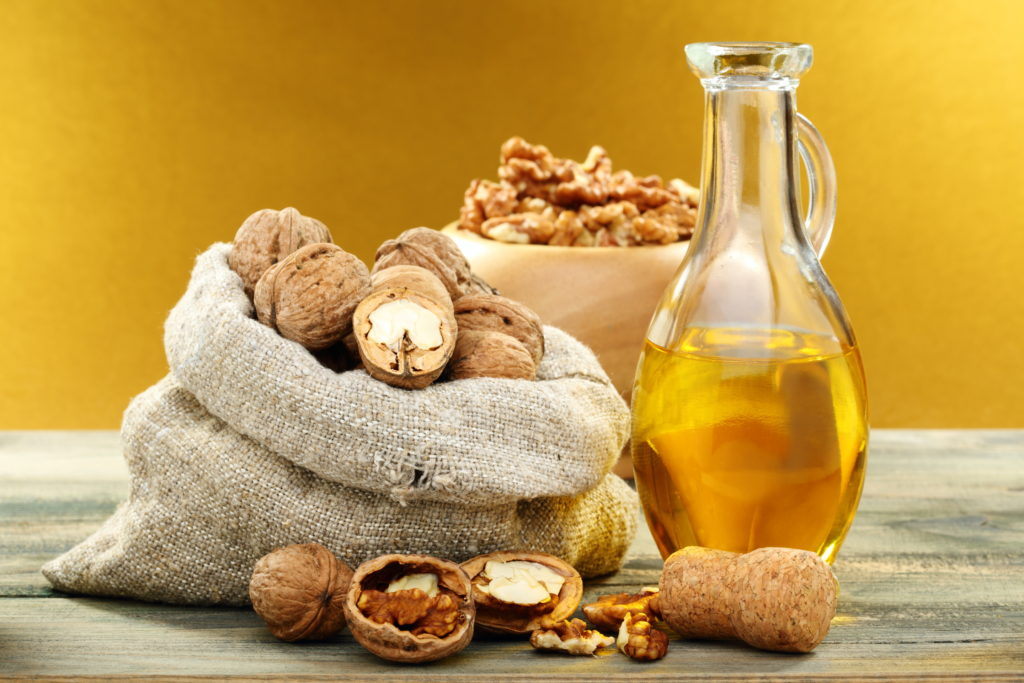Walnut Oil vs. Olive Oil

Question: I just discovered roasted walnut oil and love it in salad dressing. How does it compare to olive oil?
Answer: Walnut oil is so flavorful, and it can be a nice change from olive oil. Both oils are high in healthful unsaturated fatty acids. Whereas olive oil is about 73% monounsaturated fatty acids and 11% polyunsaturated, walnut oil is about 23% monounsaturated and 63% polyunsaturated. Walnuts are one of the few plant sources of omega-3 fatty acids (other sources include flax seed oil, canola oil and soybean oil). Walnut oil has about 10 times more alpha-linolenic acid (ALA, the essential omega-3 fatty acid in plants) than olive oil (Savva & Kafatos 2016).
Omega-3 fatty acids are protective against heart disease, but most of the research has looked at EPA and DHA, eicosapentaenoic acid and docosahexaenoic acid, which are the longer-chain omega-3 fatty acids in fatty fish. It isn’t clear whether ALA has the same benefits as EPA and DHA (Rajaram 2014). A meta-analysis that examined 27 different studies on ALA and health found “modestly lower risk” of cardiovascular disease with higher ALA consumption, but the authors emphasized that more research was needed (Pan et al. 2012).
Olive oil is protective, too. In addition to unsaturated fats, extra-virgin oil contains antioxidant and anti-inflammatory phytochemicals that contribute to its cardioprotective effects (Widmer et al. 2015). Walnuts also contain antioxidant and anti-inflammatory phytochemicals (Ros 2010).
A large study that examined the benefits of a Mediterranean diet concluded that “phytochemicals with antioxidant and anti-inflammatory properties contained in extra virgin olive oil might act synergistically with walnut-derived bioactive compounds” (Sala-Vila et al. 2016). In other words, consuming olive oil and walnuts is likely better than consuming just one or the other. That’s great news. It means you should enjoy that walnut oil on your salads, and drizzle it on grilled poultry and fish, and also use extra-virgin olive oil when you prefer its unique flavor.
In the fall and winter, try walnut oil in a salad that includes thinly sliced apples and toasted walnuts. Dress the salad with walnut oil, lemon juice, salt and pepper, then drizzle it with honey and top with a little shaved Parmesan cheese.
References
Pan, A., et al. 2012. Alpha-linolenic acid and risk of cardiovascular disease: A systematic review and meta-analysis. American Journal of Clinical Nutrition, 96, 1262-73.
Rajaram, S. 2014. Health benefits of plant-derived alpha-linolenic acid. American Journal of Clinical Nutrition, 100 (Suppl.), 443S-48S.
Ros, E. 2010. Health benefits of nut consumption. Nutrients, 2 (7), 652-82.
Sala-Vila, A., et al. 2016. Dietary alpha-linolenic acid, marine omega-3 fatty acids, and mortality in a population with high fish consumption: Findings from the PREvención con DIeta MEDiterránea (PREDIMED) study. Journal of the American Heart Association, 5 (1).
Savva, S.C., & Kafatos, A. 2016. Vegetable oils: Dietary importance. Encyclopedia of Food and Health, (pp. 365-72). Amsterdam: Elsevier.
Widmer, R.J., et al. 2015. The Mediterranean diet, its components, and cardiovascular disease. American Journal of Medicine, 128 (3), 229-38.
Sanna Delmonico, MS, RDS, CHES
"Sanna Delmonico, MS, RDN, CHE, is an associate professor at the Culinary Institute of America where she teaches food safety and nutrition. She previously led programming for the CIA Healthy Kids Collaborative and the CIA-Harvard Healthy Kitchens, Healthy Lives Continuing Medical Education Conference. Prior to joining the CIA, she was an instructor at Santa Rosa Junior College where she co-coordinated the dietetic technician program. Sanna develops delicious, seasonal recipes and writes about food and nutrition for publications, including IDEA Fitness Journal. She lives in Napa, California, and is a home winemaker."




